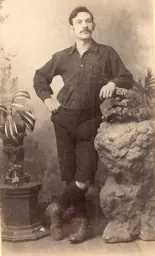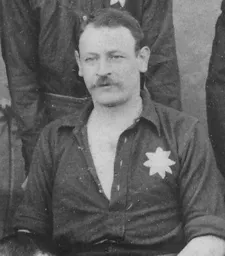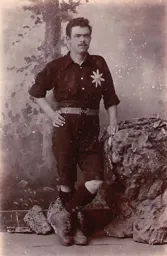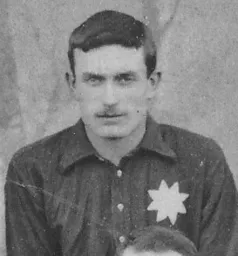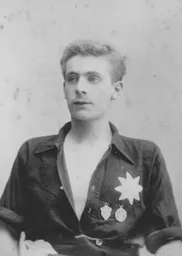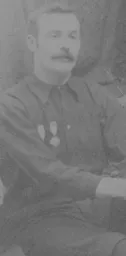The Luton Reporter -
LUTON TOWN ENTER THE 3RD ROUND. On Saturday last the Luton Town Club players engaged in what must have been considered the most arduous tussle that they have yet had this season, for they were pitted against the Old Etonians in the second round of the qualifying competition for the English Cup. It was generally felt that the ordeal through which they would have to pass would be far more severe than when they were drawn against Old St. Mark’s some weeks since, for the fame of the Old Etonians, though not quite as high as in former years, entitles them to be considered amongst the very strongest teams in the south of England. There were a great many in this district who thought very highly of their favourite’s chances, but the general feeling seemed to be one of doubt whether they would be able to pull through. The conditions under which they commenced the contest could not possibly have been better. They were playing on their own ground and in the presence of their admirers. The weather, a most important element in struggles of the kind was brilliantly fine, and the ground was in surprisingly good condition, allowance being made for the heavy rain of the previous two days. The sun shone brightly throughout the afternoon, and this, combined with the calibre of the enthusiasts of the neighbourhood. For once in a way the start was made punctually, and it was very little after 3 o’clock when the teams took up their positions round the central ring in the following order:- Old Etonians” Goal, W.J. Seton; backs, A.R. Hoare and A.V. Haughton; half-backs, A.B. Martin, G. de M. Hoare and F. Bickley; forwards, W.S. Gosling (centre), C. Alongton, G. Crabtree, R.C. Norman and E.H. Bayford. Luton Town” Goal, J. Burley; backs, A. Sanders and A. Hoy; half-backs, J.W. Julian (Captain), A.H. Taylor and J. Wright; forwards, F. Allen (centre), W. Brown and W. Chesher (right), F.K. Whitby and H. Whitby (left). The referee was Mr R.H. Jackson and the linesmen were Messrs J.H. Hackett (Luton) and F.W. Hill (Old Etonians). Julian succeeded in winning the toss, and this was a somewhat important advantage, for a very strong wind was blowing down the ground. Gosling kicked off against the wind and the sun, but he and his companions were not suffered to proceed far into their opponents’ territory. The Luton half-backs secured possession and the forwards pressed very severely, the ball passing over the Etonians’ goal line almost immediately after the start. An infraction of the off-side rule by H. Whitby relieved the pressure somewhat but the “reds” again swarmed to the attack and obtained a corner. This, however, was unproductive, the kick being sadly interfered with by the wind. The homesters continued to attack very fiercely, and two or three times they narrowly missed scoring, Sanders sending in a particularly fine shot. Chesher kicked over the top, but immediately afterwards the score was opened, F. Whitby being last on the ball during a close scrimmage in front of goal. The homesters thus obtained a lead early in the game. Their advantage was not long allowed to remain unchallenged however, for almost directly afterwards, Gosling broke past the Luton backs and scored, though the shot which he sent in was a somewhat tame one. Several misfortunes happened to the Luton side in rapid succession; first Wright was hurt, and then “hands” was awarded against them two or three times running. These did not deter them, however, and they continued to play an admirable game. Julian was displaying by far the best form of any man on the field. After F. Whitby had sent the ball skimming over the cross-bar, Burley saved in grand style, though in doing so he conceded a corner. Following some good play by Gosling, F. Whitby sent in another beauty. The visitors’ centre forward thereafter re-established possession, but he was too well watched to be able to do any mischief. A fine combined run by H. Whitby and Allen almost resulted in a score, but Seton acquitted himself in a highly satisfactory style. Corners to the homesters fell in rapid alternation. and shots by Allen and Brown almost had the desired result. On one occasion the Etonian forwards had obtained possession and looked threatening, but Sanders relieved in brilliant fashion. Seton was a noteworthy performer on his side, for while shot after shot was sent in and he was particularly hard pressed, he succeeded in stemming the onslaught and preserving his charge intact. He was unable to cope though with a very rapid kick from Sanders, who while in mid field sent the ball through the opposition posts. The homesters experienced very hard luck once or twice before half time, but they did not succeed in scoring again, the position of affairs when the interval arrived being: Luton two, Etonians one. It was generally thought that with the wind in their favour in the second half the old collegians would make a considerably better show, and that they had an extremely good chance of winning. The commencement of the second portion, however, did not flatter such hopes, for the homesters continuously pressed. The game had been in progress but a very little while when Allen notched a third point for the leaders. The Etonians obtained minor advantages shortly afterwards, but those periods of success were only transitory, and the Town Club men continued to have by far the best of matters. It was only rarely that the wearers of the white and light blue were able to get far into their enemies’ quarters, and even when they did succeed it was even a more difficult task for them to elude the vigilance of the home backs. One of the most striking performances of the afternoon was achieved by Sanders, who, after obtaining possession of the ball, made a fine dodging run. Seton was again troubled the ball being kicked into his hands and a minute later Allen sent the sphere just outside the post. Chesher, whose imperturbability had been more than usually pronounced, kicked the ball onto the net, and on several occasions thereafter he rendered himself noticeable by his coolness and pluck. The game became very exciting and play ruled fast, but despite the most strenuous efforts of the visitors they could not succeed in wresting the advantage from their foeman. Gosling seemed to be the sheet anchor, and every effort was made to pass to him, but he was too well watched by the half-backs to be very dangerous. Hoy was somewhat badly kicked, but after a minute’s suspension of play he was able to resume. The enthusiasm of the spectators had been intense during the last few minutes, and it was raised to the highest pitch when F. Whitby headed through after a very determined scrimmage in front of the uprights. With the score standing at four to one it was felt that the victory practically rested with the locals, but they did not allow feelings of security distract their play. The Etonians about this time were showing far better style than previously , and on several occasions they made strenuous attempts to score. Gosling made a grand single handed run, but he was not allowed to proceed very far. Burley, who had been acquitting himself in a highly satisfactory way, tumbled over in the mouth of his goal, but he stuck to the ball and managed to get rid of it over the line. From now to the finish the game was of a give and take character. Both teams tried all they knew to increase their total, and just before the referee blew his whistle Norman obtained a second notch for the Etonians. It was generally agreed that time had been exceeded by some three or four minutes, and it was only when the spectators sent up a unanimous shout that the stated period had elapsed that the game was stopped. The result was not seriously affected, however, for at the close it was found that the Town representatives had by scoring four goals to two entitled themselves to be included amongst the first four teams in the division. They will thus have to engage in a fortnight in the semi-final round of the qualifying contest.”


